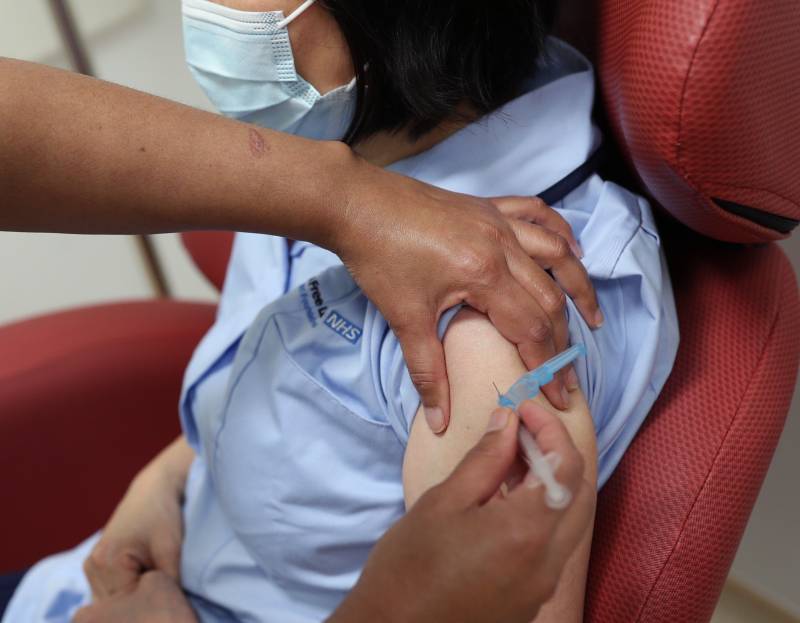UK readies 'V-Day' Covid vaccination campaign

Stay tuned with 24 News HD Android App

Britain on Monday prepared to start its biggest ever immunisation campaign but health officials warned the drive to inoculate millions against Covid-19 would be a "marathon" stretching well into next year.
The world-first rollout of the Pfizer-BioNTech vaccine is due to start on Tuesday -- dubbed "V-Day" by Health Secretary Matt Hancock, who has volunteered to take it live on television to assuage any public doubts over the rapid approval.
Croydon University Hospital in south London is one of 50 clinical hubs that started receiving the country's initial consignment of 800,000 doses over the weekend, from a Pfizer plant in Belgium.
The vaccine rollout coincides with the end-game of Brexit talks on Britain's future trading relationship with the European Union.
The government reportedly has military flights on standby to transport the jabs from Belgium, in case the negotiations collapse and new rules cause border chaos from January 1.
"I have no doubt that the EU will help us to facilitate travel," Foreign Office minister James Cleverly told Sky News, as anxiety mounts of disruption to cross-Channel shipping from a "no deal" outcome.
At the Croydon hospital, a lab technician lifted a package of doses out of dry ice in a box storing the vaccine at -70 degrees Celsius (-94 degrees Fahrenheit), and transferred the batch to a specialist freezer.
"To know that they are here, and we are amongst the first in the country to actually receive the vaccine and therefore the first in the world, is just amazing, I'm so proud," said Louise Coughlan, joint chief pharmacist at the Croydon hospital trust.
First in line will be people aged 80 and over, care home workers, and frontline staff in the state-run National Health Service (NHS) who are considered at higher risk.
Rockers and royals
The government also wants to prioritise elderly residents in care homes but is running into technical challenges in administering the doses away from hospital hubs, given the need for ultra-low storage temperatures and how the vaccine is packaged.
The Pfizer-BioNTech jab will be administered in two doses, three weeks apart. So Britain's initial batch will cover 400,000 people, and the government has 40 million doses on order in total.
It hopes for many more from other drug companies, including a candidate from Oxford University and AstraZeneca still being evaluated.
Approval for the Pfizer-BioNTech vaccine is expected later this month in the United States and EU.
NHS national medical director Stephen Powis said Britain's rollout would be a "marathon not a sprint", with the government sequencing priority groups by age and health condition.
It does not expect to reach younger groups until spring or summer 2021.
"Despite the huge complexities, hospitals will kickstart the first phase of the largest-scale vaccination campaign in our country's history from Tuesday," Powis said.
"Hardworking staff will once again rise to the challenge to protect the most vulnerable people from this awful disease."
Queen Elizabeth II, 94, and her 99-year-old husband Prince Philip are in line to get the jab early in the rollout because of their age, reports said over the weekend.
Britain's most senior royals will convey to the public that they have been given the inoculations "as a powerful counter to the anti-vaccination movement", the Sunday Times said.
The Sunday Mirror reported that Monty Python star Michael Palin, 77, campaigning singer Bob Geldof, 69, and 73-year-old Ronnie Wood of The Rolling Stones were also committed publicly to getting the vaccine in a bid to boost take-up.
A YouGov poll of more than 5,300 people published last Wednesday indicated 27 percent of people were "very confident" about the safety of the Pfizer-BioNTech vaccine.
A total of 43 percent were "somewhat confident", 11 percent "not very confident", and nine percent "not confident at all". Just under half (44 percent) opposed compulsory vaccination while more than third (37 percent) backed the idea.
